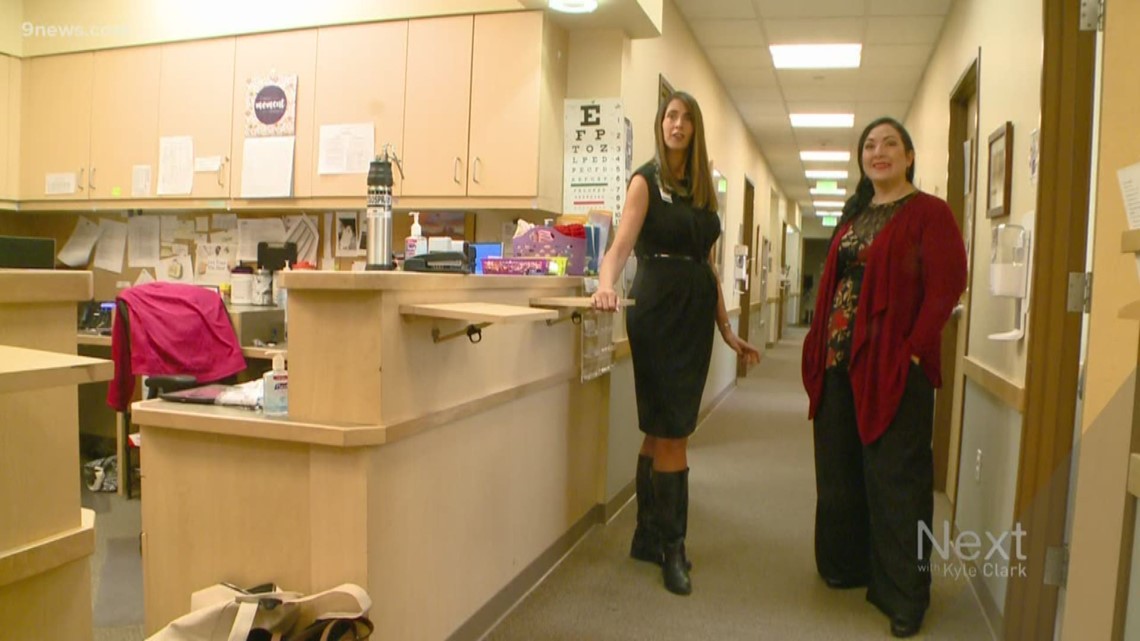DENVER — Boulder Community Health is changing the way patients are treated.
They're integrating medical and mental health services for patients, and it's working so well, according to their doctors, that they can't imagine going back to the way treatment used to be.
As first reported by The Colorado Sun, BCH is one of hundreds of primary care hospitals and clinics that have started working on these integrated services to help provide access to mental health help.
For Gina Machengo, it helped her solve a medical mystery that she suffered through for around two years.
"I was sleep-deprived," she said. "My diet changed."
Machengo had been suffering headaches, heart palpitations and hypertension. Then, her primary care doctor made a different kind of suggestion: to visit with a behavioral health specialist — in particular, Julie Jungman.
"We tried to investigate whether or not anxiety could be the culprit," said Jungman.
It was.
Together, Jungman and Machengo came up with a plan that involved meditation, writing in a journal and different techniques to help her manage her anxiety. But what was different was that Machengo never had to leave the Boulder Community Health complex to get help.
"It was a tremendous relief to know everything was connected — that I didn't have to get referrals to different places to see if different practitioners were taking my insurance," she said.
BCH has been expanding this integrated practice for roughly six years and now has eight behavioral health specialists working at the BCH sites in Boulder and Broomfield counties.
The intention is to increase access to mental health resources at the point most people reach out for help. Behavioral health specialists can be called in during a primary care visit, or they can reach out to a patient the same day.
"Having it embedded in primary care takes away a lot of stigma that I think still exists," said Dr. Elizabeth Cruz, the medical director for ambulatory services. "It's easier to come to your primary care doctor to access counseling, and there is less of a barrier there."
Cruz said it's particularly important because she estimates in their primary care at BCH, 30% of their practice is for behavioral health issues.
There are more than 300 primary care sites focused on combining services through the Colorado State Innovation Model.
The medical facilities worked on these programs with the help of the federal grant in effect from 2015 to 2019 and will be deciding if they continue this kind of program.
"I can't imagine going back to the way we were practicing before," said Cruz. "This is so much better."
Ben Miller, the chief strategy officer at the non-profit Well Being Trust, said the shift towards integrated care is a very important one.
"They way we've managed health care for so long doesn't make a lot of sense," he said.
It also helps explain why it took so long for this kind of change to happen.
"We have fragmented culture that treated mental health so differently from medical care," he said. "It's taken a lot of time to figure out how to do it. You have to think about how we finance care, how we policy care. Basically all the things that go into an integrated unit, we haven't figured that out yet."
This kind of work is moving the needle, at least according to the Colorado Health Institute. Their recent statewide health survey showed some positive trends when it comes to access to health care.
"Even though it's a little 2% increase in the number of people who did that with their doctor, that represents 115, 100,000 people," said CEO Michelle Lueck.
The Colorado Health Institute said offering more holistic treatment could be one of the factors in this change. Lueck also said another big question is how to continue to meet demands for mental health services.
As for how much this would cost patients, Betsy Duckett, the director of Integrated Clinical Services at BCH, said through working with an insurance company as well as state and federal funding, most patients aren't paying additional costs for this new kind of service.
Miller said, in general, it depends on what kind of insurance a patient has and that nationally he's seen more insurance companies moving towards supporting treatment programs like this.
SUGGESTED VIDEOS: Next with Kyle Clark

